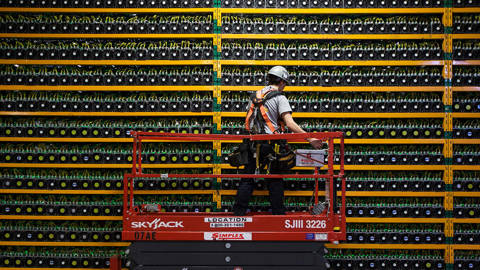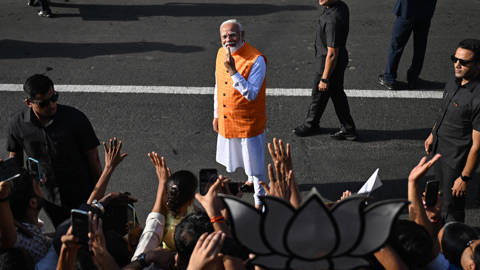Is Crypto Going Mainstream?
After over a decade on the fringes of the global monetary system, digital currencies are increasingly being embraced by companies, governments, and citizens around the world. Are they set to become an integral part of the global monetary system?
Listen and subscribe to all episodes from your favorite podcast app. Find Opinion Has It on Apple Podcasts, Google Podcasts, Acast, or via RSS Feed. Have a suggestion for an episode? Email us at podcasts@project-syndicate.org.
Transcript
Elmira Bayrasli: Welcome to Opinion Has It. I’m Elmira Bayrasli.
Everyone’s talking about cryptocurrencies. Some say they’ll save the world.
Archive Recording, Brian Armstrong, CEO of Coinbase: You know, we all grew up in this world where every country has their own currency. But the economy is increasingly global, and the internet is global. You know, why isn’t there a global currency?
EB: Others compare cryptocurrencies to a Ponzi scheme.
Archive Recording, Nassim Nicholas Taleb: I realized that it was not a currency without government. It was just pure speculation. It’s just like a game. Nothing. I mean, nothing else. I mean, you can create another game and call it a currency.
EB: The debate is now more urgent than ever. After over a decade on the fringes of the global monetary system, cryptocurrencies seem to be moving into the mainstream.
Archive Recording: Bitcoin has turned from an idea into one of the most talked about financial assets.
Archive Recording: El Salvador could become the first country in the world to make Bitcoin legal tender.
Archive Recording, William Soriano: Bitcoiners around the world, the time has come. We are ready.
Archive Recording: In Cuba, Mexico, and Venezuela, residents are increasingly turning towards cryptocurrencies, which are mostly unregulated and decentralized.
EB: Are cryptocurrencies set to become an integral part of the monetary system?
Hi Sheila, how’s it going?
Sheila Warren: It’s going well. Thanks so much for having me on today.
EB: Here to help us answer this question is Sheila Warren. Sheila is the deputy head of the Centre for the Fourth Industrial Revolution at the World Economic Forum. She is the co-host of Money Reimagined, a podcast on the CoinDesk network.
SW: Yup, it’s recording.
EB: She joins us from her home in San Francisco.
Sheila, I want to start by looking at the problems cryptocurrencies are meant to solve. Which arguments in favor of decentralized digital money would you say are the most convincing?
SW: So, one I would say is that, right now, there is an inefficiency, from the standpoint of it takes a lot of time to move money. Let’s call it – let’s talk about the cross-border-use case. Moving money across a border is pretty – it’s more costly than you might think, and it takes time. And the reason for that is because every time money moves from an actor to an actor, a bank to a bank, you know, et cetera, each actor has to conduct its own due diligence, do its own vetting, and all this kind of stuff. And that gets expensive. If you can cut out a lot of those middlemen and go direct – point to point, peer to peer, person to person, entity to entity, whatever it is – you can save not only money, but time. That’s kind of one. Let’s call that the “efficiency use” case. So, that’s one thing. Their demonstrable value, pretty clear, lots of activity. And that was from the beginning, in the very early days. That’s kind of one thing.
Then you’ve got what a lot of the rhetoric is around, which is, “well, if we can be more efficient and therefore cheaper” – [that] is kind of the underlying concept – “then wouldn’t we be able to include more people in the global economy?” So, you hear a lot about what’s called remittance payments. That is kind of a very small-value payment – maybe on the order of a couple dollars, $10, $20 – from a person to another person, usually in another country.
Okay. So, a lot of remittance corridors – let’s just take the US – there are tremendous remittance corridors to Mexico, the Philippines, El Salvador, Haiti, right? And diaspora community members are sending money home. So, if you’re extracting a dollar off of $20, that’s hugely significant. A dollar off a million, okay, who notices, right? A dollar off $10, $20? That is really, really a lot of money. It adds up fast.
Not to mention, okay, on top of that, in some of these countries, you can’t even get a bank to engage with you at such a small dollar amount. They’re like, “Forget it. We’re not transferring your 20 bucks. You know, it’s just not worth our time, because we have to conduct a certain, very specific due diligence on the recipient to make sure they’re not a terrorist or a criminal or whatever. We don’t want to do that, because the amount of money is not worth it to us.”
So, historical exclusion comes a little bit from the banking system, making choices about who is risk-worthy and worth the return on investment to engage and what countries are worth it. So, you have, when you look across the world, you’ve got countries that are just not able to access the banking system without paying tremendous cost. That is a place where I think we can also see there’s tremendous potential there. It has not historically been the focus of the crypto economy, apart from within countries. We are starting to see quite a bit of – there’s all kinds of experiments happening that I’m really positive and bullish on. But we’ve yet to see any of those experiments at scale.
EB: So Bitcoin first came on the scene shortly after the 2008 global financial crisis. Even if the timing was a coincidence, Bitcoin did develop in the wake of that event. How did the financial system’s shortcomings work to Bitcoin’s advantage?
SW: So, I think that 2008 revealed a lot. I’ll kind of fast-forward to the pandemic, because I think, similarly, both of these different, massive global shocks evidenced some pretty obvious things that were known, but weren’t really talked about. Number one, tremendous inequality in access to the system. After 2008, there were certain kinds of communities and people who lost their jobs, who went bankrupt, and other kinds who didn’t, who didn’t really experience those same catastrophic consequences, right? Or if they did, they weren’t catastrophic in the same way. They were recoverable. And so, when you talk about the financial system’s shortcomings, the ones I want to focus on are not so much liquidity risk or things like this, which are important. It’s really who is that system serving and who is it not serving?
Okay. Now, cryptographers were noting that there were possibilities and there was a potential to engage in exchange of value outside of the traditional financial system, so that you would basically be protected from any shocks to that system, because you weren’t necessarily engaging within it. So the idea was, we could create this parallel system that is just as reliable as the financial system, because when you think about what do the intermediaries do, why do people trust them? Well, what’s a blockchain do? So, if you and I, Elmira, wanted to exchange value, I would take out my phone; you’d take out your phone, whatever. We would pick our app of choice – Venmo, PayPal, Square, Zelle, whatever – and I would send you 20 bucks, right? And we would just kind of walk away knowing that my bank, your bank, the app, whatever, they were handling that settlement. That was what the banking system really gave people, was finality of that transaction. You knew that you could rely [on it], and if the transaction didn’t happen, you’d go to the bank. You had recourse. You could say, “Hey, you didn’t share my 20 bucks. What’s going on?” You know, that kind of thing.
What if you didn’t have any of those systems in place? How would you create that same trust within the system? That’s what blockchain, the Bitcoin network, really does, right? It substitutes for those – my bank, your bank, the app – it substitutes a network of computers that are essentially witnessing and sealing, let’s call it, the transaction. And so the idea there is we’re not reliant on the banking system. If there’s a run on the bank, who cares? It doesn’t matter, because we are outside of that system. We’re independent from it, right? So that’s the relationship, I think, that people started to get very interested in after 2008, is: Should there be some kind of parallel system? What about the people who can’t engage with that system? What about people who are excluded from it? But also, you know, how do we protect ourselves from systemic shock and risk to this system? Because we’ve seen it happen, and it’s going to happen again presumably, right? It’s not a one-time thing, as much as people might want it to be.
EB: For most of their short history, virtual currencies have been seen as an asset or a store of value. But that’s starting to change.
Archive Recording: Cryptocurrency is starting to take hold of the way we buy and sell products now, as more companies are starting to embrace Bitcoin. Elon Musk recently announced people can use Bitcoin to buy a Tesla. Even some medical services can be paid for with it. And for the first time, cryptocurrency was used to buy a Major League Baseball ticket in Oakland.
EB: Tesla started accepting Bitcoin last year, before reversing its decision. Now it says it will most likely start accepting it again. Amazon has also said that it’s exploring whether to accept Bitcoin. And PayPal has added a “Checkout with Crypto” option to its service. CEO Dan Schulman showed the world how to use it back in April.
Archive Recording, Dan Schulman, CEO of Paypal: And here is my Bitcoin bounce. And I am now going to...
EB: Sheila says we’re likely to see this trend continue. But we still have a ways to go before crypto becomes a widely used means of exchange.
SW: It depends where you are in the world. So, right now, I mean, I’m certainly not paying for coffee in Bitcoin, in part because I have an expectation Bitcoin is going to become more valuable. Now there’s this infamous story about the first transaction that happened with Bitcoin was someone bought a pizza. That pizza, I forget the current value of it, but I mean, it’s a lot of money. Like, that Bitcoin that was used to pay for that pizza, let me tell you, that’d be worth a lot more today. Now, I’m grateful that that happened, because it kind of proved the point. It was sort of a test. But people aren’t really doing that necessarily, because a lot of people, especially in the United States or in more developed economies, are looking at it as an investment. And they’re kind of holding it as a store of value.
Now, in some places – El Salvador is an example that’s going to come up, I’m sure – they’ve made Bitcoin a form of legal tender, which means that you can pay for things in Bitcoin, and that’s an accepted coin of the realm, if you will. So again, I mean, it really varies depending on your circumstances. I think a lot of these companies are paving the way for this to become a more regular form of payment. It’s not that it’s happening necessarily right now in massive amounts. It’s that this is something that’s going to keep happening.
EB: As this process continues, significant barriers will have to be overcome. For one thing, using a cryptocurrency to pay for things isn’t all that easy. What’s more, surveys show that a majority of people don’t really understand how it works. Many simply don’t trust them. Just ask El Salvador.
Archive Recording: It was the first day in the first country in the world to adopt Bitcoin as legal tender. But as El Salvador rolled the cryptocurrency out, things didn’t go quite as planned.
Archive Recording: More than a thousand people protested against Bitcoin in El Salvador’s capital on Tuesday.
Archive Recording: Polls indicate that Salvadorans are wary of the volatile cryptocurrency, which can shed or gain hundreds of dollars in value overnight.
EB: When it came time for the Bitcoin rollout, many Salvadorans stood in long lines at ATMs to convert the Bitcoin the government had given them into US dollars. Technical glitches didn’t help matters.
Archive Recording: The government has launched its own digital wallet called Chivo and promised $30 worth of Bitcoin for new users. The first day, though, was hit with some snags. Many people said that the Chivo app was not available to be downloaded on popular app stores. The president describing that as “teething problems” that he said would soon be sorted out.
EB: Sheila, while virtual currencies have the potential to boost financial inclusion, there are significant barriers to expanding their use, particularly in developing countries. And here, I want to take a look at El Salvador. Only 50% of Salvadorans use the internet, and almost a quarter live below the poverty line. How might the adoption of virtual currencies widen the digital divide?
SW: It’s such an excellent question. It’s something that we think a lot about here at the [World Economic] Forum. In fact, we have a paper coming out in October talking exactly about financial inclusion and, you know, what is the potential for any technology – cryptocurrency or digital currencies, specifically, but really any technology – to solve those problems?
The important thing I would say is that no technology can solve the problems of inclusion and access. Period, none, right? These are societal problems. They are human problems. But more than that, I would say they are prioritization problems. Until and unless we prioritize inclusion of excluded communities in our systems, it’s not going to happen.
Now, I think of digital currencies – virtual currencies, as you call them – as being one of the most promising tools that we have to address these issues, 100%. But again, it’s not going to happen unless we’re contextualizing this, and we’re making sure that we are looking systemically at all the issues that go into place. Now, you have to look at the system. You can’t just say, “Oh, now we’re just going to take everything and move it digital. And it’s all going to solve the problem.” Well no, that isn’t going to solve the problem unless you’re making sure you’re creating an access point, an engagement point, right? Where a person has what they need to engage with that system. And that’s sometimes the really hard part.
I am very skeptical about – let’s say El Salvador proves to be super successful. It just takes off, the whole country converts to Bitcoin, they’re using it for everything. Fantastic. It doesn’t necessarily mean that that same approach is going to work anywhere else, right? Because it is context-dependent. You have a particular leader in that country, a particular environment in that country, a particular history in that country, cultural awareness in that country, all these things that, combined, I hope it’s a gigantic success. But let’s not assume we can then scale that all over the world.
EB: There are other reasons to be skeptical about the uptake of virtual currencies. Many economists criticized El Salvador’s decision to adopt Bitcoin. They argued that it could lead to instability and inflation in an already poor country. This is partly because Bitcoin’s value is so volatile.
Archive Recording: Bitcoin is on a bit of a wild ride today as it faces the biggest test yet.
Archive Recording: Bitcoin licking its wounds following the heaviest losses that we saw in two and a half months yesterday.
Archive Recording: This coming on a day when El Salvador’s become the first country to adopt Bitcoin.
Archive Recording: The simple idea of buying the rumor, selling the fact.
EB: Yet these issues haven’t deterred crypto investors.
Archive Recording: The crypto craze, we call it a craze because we had some crazy numbers this week.
Archive Recording: Two trillion dollars. That’s a pretty big number. Only two months ago, it was $1 trillion.
Archive Recording: That’s the new high for the entire cryptocurrency market cap.
Archive Recording: The entire crypto market is bigger than Alphabet, Facebook, notably, not Apple just yet, but here we go.
EB: In the United States, more than 13% of Americans have bought or traded cryptocurrencies in the last year. By comparison, 24% of Americans invested in stocks during that same period. Now, policymakers are paying attention.
Archive Recording, US Senator Elizabeth Warren: It’s the Wild West out there. Do we need some regulation around this? You bet we do.
EB: Earlier this fall, a few US senators briefly held up President [Joe] Biden’s infrastructure bill because of a disagreement over taxing cryptocurrency brokers.
Archive Recording, US Senator Pat Toomey: We could have a very chilling effect on the development of this technology. And that’s what I am most concerned about. That’s what I want to avoid.
EB: Like Senator Toomey, Sheila worries that the current approach to regulating cryptocurrencies could backfire.
SW: The US is all over the place. Let’s just say it, right? Like, depending on the agency you talk to, we can’t really even agree which agencies should be regulating what parts of this and where. There’s not consistency. It’s a really hard time for the industry to know what to do and to know how to build. And we’re at a time that I think is fraught, because some countries are going to embrace this wholeheartedly, as they’ve done. Some are going to just kind of try to ignore it, which doesn’t really make sense, but I suppose it’s not bad for the industry. And some are just going to say, “No, it’s too risky. There’s too much going on. And so we’re just going to kill it and say forget it.”
But I think what’s happening here is that there’s just a fundamental sort of misunderstanding about what the technology could do, and there’s an attempt, which I think is generally well-intentioned, on the part of regulators around the world to make sense of it by boxing it into something that they know. And so anytime you take something that is truly innovative and new – which this is, 100%, there’s just things about this that have never been seen in the entire world before – and you try to make sense of it, well, you risk it resembling the thing that you’re trying to box it into being, right? So kind of the way I summarize this is: if you force something to quack like a duck, then you start believing it is a duck, when actually it’s a bird never seen before. And you forget the things about it that make it unique. And then you start regulating it, in this case, like it’s a duck, but it’s not a duck.
And so this is what I find really hard and complicated. And I don’t envy regulators, politicians trying to make sense of this space, because it’s really hard. It’s hard to make sense of something that’s growing so fast, where the possibilities really are dependent upon the priorities, as I mentioned, of the industry itself. And so it’s hard to understand what this is, and in trying to make sense of it, trying to protect people, even with the best intentions, I really worry we’re going to stifle innovation that ultimately will lead us to these more open, inclusive systems that I actually think, ultimately, most of us, if not the vast majority of us, really want.
EB: So how do we balance the need to regulate with the risks of over-regulation?
SW: I think it isn’t even so much over-regulation as it is premature regulation. So, one of the things that’s really – so, a lot of people tend to make the analogy of the early days of the internet. “Oh, look, isn’t it such a great thing that we didn’t over-regulate the internet, because if we had, we wouldn’t have blah, blah, blah, blah, blah.” Okay, well, A) there was a lot of push to regulate the internet as if it were telephone, like telephone systems, or if it were a commodity. There was a lot of push to do that. And actually it was like a handful of people, like a dozen people, who pushed back really hard on that and said, “Don’t regulate technology. Let this thing thrive; let it be open. And let’s see what happens with it.” Right now, you could argue good and bad came from that. And that’s certainly true of anything.
Similarly here, I don’t think anybody wants to regulate technology. What’s complicated, and we’ll go back to Bitcoin, is that you had the technology and the application coming out at the same time. Bitcoin is a method of exchanging value, right? It’s a method of kind of making a payment. It’s also a revolutionary technology. How do you leave that part alone, but then think about, it’s the human behavior that you actually want to incentivize correctly or “regulate.” Right? That’s complicated. It’s complicated, because they’re really tied together in many ways.
So again, to go back to kind of my, you know, is it a duck? It’s not. It’s something we’ve never seen before. We don’t even have a name for it, what this bird is, let’s say. And so I think the question is, when have we evolved enough to start engaging in that kind of regulatory space? And that is a question of opinion, quite honestly. My personal view, very strongly, is not yet. I think personally, it’s when I have seen things that are sub-scale in the access space become more mainstream. Like I really worry that again, we’ll cut off the innovation needed to provide that kind of access before we get there. And we’ll wind up replicating our existing financial system with all of its embedded inequalities, because we are going to regulate it as if it is bad. And that is a huge concern that I have.
EB: Regulation isn’t the only way governments are looking to shape the growing cryptocurrency market. Central banks are now creating their own digital currencies.
Archive Recording: China has created its own form of digital currency. Known as the digital yuan, the currency will be owned by the central bank.
Archive Recording: [The US] Federal Reserve announcing it’s taking another step at looking at the possibility of issuing a central bank digital currency.
Archive Recording: Now the European Central Bank is formally beginning a project to create a digital euro.
EB: Central banks see major opportunities in this domain. That’s partly because, unlike cash or cryptocurrencies like Bitcoin, central bank digital currencies are programmable. This means they can be tracked and encoded in ways that limit how they are spent or when they are dispersed. Sheila thinks this could be a game-changer.
SW: Okay, so there’s this concept in the crypto industry of something called a smart contract. This is a piece of code that basically codifies certain contractual provisions. I’ll keep this really simple. An example is flight insurance. Pretend we’re traveling again. I’m not quite yet, but hopefully soon we’ll be on a plane again. And so, I buy my flight. I maybe buy flight insurance. And the idea is, oh, if there’s a weather event or a fire or whatever. God knows what would happen these days – some climate event, you know. Right now, what happens in reality is my flight gets grounded or whatever. More often than not, I’ve got to stand at the counter; I’ve got to make a phone call. It’s a big hassle. It’s very dramatic. I get my $10 for my, whatever, you know, whatever. Right. It’s all, it’s very, very painful for everybody.
Imagine if you had what we call an oracle – an oracle is an independent third party that is objective: the weather service in this case, right? – that’s going to verify, oh, there’s a hurricane, so your flight can’t take off or it can’t land. That information comes through a system, and then automatically that triggers the receipt in my digital wallet of my hundred bucks or ten bucks or a drink ticket or whatever it is, and the rebooking of my flight. It all just happens automatically, because it’s coded. So, programmability basically just means you can take these different units of things. You can put smart contracts among them, put them to different places – a smart contract is one element of this – and you can basically just create systems that are almost modularized. And that’s, it’s just a really, really powerful concept.
Central banks are interested in this, to go back to your question, because they can kind of create very, very highly targeted monetary-policy stimulus, interventions, that are almost like micro-targeted. And that’s something that can be done when you know exactly where the money’s going, because it’s going to a digital wallet. So, central banks are looking at this for a variety of reasons, but one of these is this ability to create more finely tuned stimulus, monetary policy, things like this, that can be more responsive and reactive in a more efficient timeframe to whatever they’re seeing happening, whatever they want to see effected.
EB: Sheila, major corporations like Facebook are also creating their own digital currencies. Then there are the central bank digital currencies, plus cryptocurrencies that we already know about like Bitcoin. The monetary system is starting to look pretty crowded. Can all these different kinds of currencies work together within a reasonably stable system?
SW: I think that that is the only actual solution. So, I’ve never been of the mindset of there’s going to be, you know, one coin to rule them all. These things have different purposes. If you’re a central bank, your goals are very different from if you’re a corporation. They are different from if you’re seeking to be outside of that system altogether. You know? And so, I think that the interoperability of these systems – whether that’s through kinds of access points, when you kind of, we call it “on-ramp” or “off-ramp” in and out of fiat money – you know, are important.
We don’t assume that the cryptocurrency space is going to be the tool used by a central bank who wants to have tight control over the supply and the monetary system. That’s just not – why would that make any sense? It is, by definition, not controlled by a central authority. Why would it make sense that cryptocurrency could be a tool used by a central bank?
On the other hand, you’ve got people in crypto who are like, “Well, we don’t need central-bank money anymore, because we’ve got crypto.” Well, that doesn’t make any sense either, right? Because there’s a lot of activity that happens with fiat money that isn’t just about monetary policy. It’s used as a political tool all the time. We may not like that. Or, a person may not like that. It doesn’t make it untrue. That’s just a fact, you know? So there’s a lot that’s going on. We also have to be mindful of the fact that, you know, government services – our taxes pay for government services. Now, political views on what those services are, their quality, may widely differ. Nevertheless, that’s a model we have in society, right?
So, the idea to me that we would suddenly abandon all fiat money, CBDC, central bank money, issued money, for crypto is just as crazy as the idea that cryptocurrency is not necessary or is not useful. Like both those things make no sense to me. I very much think that we are going to have a permanent world in which all of these things – CBDCs (central bank digital currencies) and cryptocurrencies – are existing in parallel. They are fit for different purposes. They’re used for different kinds of things. But what I think we’re trending towards is fluidity, as you can exchange in and out of those different kinds of currencies, depending on what it is that you’re doing, where you are in the world, et cetera. And there is some ability to operate across those systems or even within them in parallel.
EB: The outcome may partly come down to something that’s been in short supply recently: trust. People are skeptical of currencies like Bitcoin, partly because there is no institution guaranteeing their value. But there’s also plenty of mistrust of government institutions, including central banks.
Archive Recording: As the economy recovers and Americans return to work, they’re noticing something.
Archive Recording: Airline prices, hotels, rental cars. It seems like everything across the board is becoming more expensive.
Archive Recording: Last month, inflation rose at the fastest pace in nearly 13 years.
Archive Recording: The Fed is calling it transitory, but top economist Mohamed El-Erian isn’t so sure.
Archive, Recording, Mohamed El-Erian: Every day, I see more evidence of inflation not being transitory. And I have concern that the Fed is falling behind.
EB: Major corporations are facing backlash, too. Trust in the tech industry, in particular, dropped to a record low in 2021.
Archive Recording: Facebook’s Instagram app is harmful to a number of teenagers and Facebook knows it.
Archive Recording: The latest reporting also showing Facebook publicly downplayed the ill effects of Instagram on multiple occasions.
EB: But no monetary system can work without trust.
Sheila, it seems to me that these changes could be pretty destabilizing, especially given how little trust there is among the government, business, and citizens nowadays. How can we build more trust in our changing monetary system?
SW: So, this notion of trust is something I think extends far beyond cryptocurrency, digital currencies, anything like that. And it’s really about, do we trust ourselves more than we trust any institution? If that’s the case, how do we think about empowering ourselves within these systems? How do we think about user agency? And some of that is design, but some of that is actually allowing people to make choices about the ways they want to engage with systems. Right now, when I go into payment-provider option on my mobile phone, I have no choice in that system. Now, I personally don’t care; I just want the finality of the transaction to be complete. That’s what I go to the systems for is to be able to send you money and walk away. But for a lot of people, they want more, they want more ability to control their experience, to control what’s happening.
I think that this is more true when it comes to data than when it comes to money. So, when it comes to data, people at least say – although they don’t act this way always – they say they want a lot more control about who gets to see that kind of information, what’s private, what’s anonymous, what’s pseudonymous, and all that kind of thing. And so, some of these designs can be built more into these systems. And as you have more ability to control who sees what and all that kind of thing, the hope is that that’s going to engender more trust in the ability that you have and the willingness you have to interact and engage in these systems of record. But this is one of the biggest problems we’re facing as a society. And again, the trust problem can’t be solved by any technology acting in isolation or operating in isolation. It is a systemic problem that’s going to take a lot of effort to resolve.
EB: Sheila, thank you.
SW: Yeah, thank you.
EB: That was Sheila Warren, the deputy head of the Centre for the Fourth Industrial Revolution at the World Economic Forum. And that’s it for this episode. Thanks for listening. We’d love to hear what you think. Please rate and review our podcast. Better yet, subscribe on your favorite listening app. You can also follow us on Twitter by searching for @prosyn. That’s P-R-O-S-Y-N. Until next time, I’m Elmira Bayrasli.
Opinion Has It is produced and edited by Kasia Broussalian. Special thanks to Project Syndicate editors Whitney Arana and Jonathan Stein.










